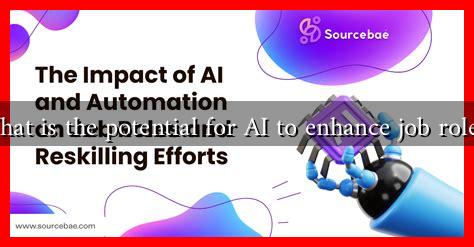-
Table of Contents
What is the Potential for AI to Enhance Job Roles?
Artificial Intelligence (AI) is rapidly transforming the workplace, offering unprecedented opportunities to enhance job roles across various industries. As organizations increasingly adopt AI technologies, the potential for these tools to augment human capabilities is becoming clearer. This article explores how AI can enhance job roles, the benefits it brings, and the challenges that accompany its integration.
The Role of AI in Job Enhancement
AI technologies can significantly improve job performance by automating routine tasks, providing data-driven insights, and facilitating better decision-making. Here are some key areas where AI is making a difference:
- Automation of Repetitive Tasks: AI can handle mundane tasks such as data entry, scheduling, and inventory management, allowing employees to focus on more strategic activities.
- Data Analysis and Insights: AI algorithms can analyze vast amounts of data quickly, providing insights that help employees make informed decisions.
- Personalization: AI can tailor experiences for customers and clients, enhancing service delivery and improving satisfaction.
- Collaboration Tools: AI-powered tools can facilitate better communication and collaboration among team members, regardless of their location.
Case Studies: AI in Action
Several organizations have successfully integrated AI into their operations, demonstrating its potential to enhance job roles:
- IBM Watson: IBM’s AI platform has been used in healthcare to assist doctors in diagnosing diseases. By analyzing patient data and medical literature, Watson provides recommendations that enhance the decision-making process for healthcare professionals.
- Salesforce Einstein: This AI tool helps sales teams by predicting customer behavior and automating routine tasks, allowing sales representatives to focus on building relationships and closing deals.
- Amazon: The retail giant uses AI for inventory management and customer service. AI-driven chatbots handle customer inquiries, freeing up human agents to tackle more complex issues.
Benefits of AI in the Workplace
The integration of AI into job roles offers numerous benefits, including:
- Increased Efficiency: By automating repetitive tasks, AI allows employees to complete their work more quickly and accurately.
- Enhanced Creativity: With AI handling routine tasks, employees have more time to engage in creative problem-solving and innovation.
- Improved Job Satisfaction: Employees often report higher job satisfaction when they can focus on meaningful work rather than mundane tasks.
- Better Decision-Making: AI provides data-driven insights that help employees make informed decisions, reducing the risk of errors.
Challenges and Considerations
While the potential for AI to enhance job roles is significant, there are challenges that organizations must address:
- Job Displacement: The automation of tasks may lead to job losses in certain sectors, raising concerns about workforce displacement.
- Skill Gaps: Employees may require new skills to work effectively alongside AI technologies, necessitating ongoing training and development.
- Ethical Considerations: The use of AI raises ethical questions regarding data privacy, bias, and accountability that organizations must navigate.
The Future of AI in the Workplace
The future of AI in the workplace looks promising, with continued advancements expected to further enhance job roles. According to a report by McKinsey, AI could contribute up to $13 trillion to the global economy by 2030, highlighting its transformative potential. As organizations embrace AI, they will need to foster a culture of continuous learning and adaptability to fully leverage these technologies.
Conclusion
AI has the potential to significantly enhance job roles by automating routine tasks, providing valuable insights, and improving decision-making processes. While there are challenges to consider, the benefits of AI integration are substantial, leading to increased efficiency, creativity, and job satisfaction. As we move forward, organizations must prioritize training and ethical considerations to ensure a harmonious coexistence between AI and the human workforce. Embracing AI not only prepares businesses for the future but also empowers employees to thrive in an increasingly digital world.
For more insights on AI and its impact on the workforce, visit McKinsey & Company.

